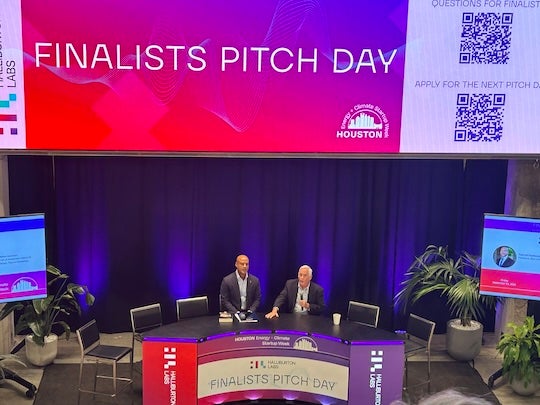Rice University President Reginald DesRoches spoke with author Walter Isaacson at a fireside chat ahead of a startup pitch day hosted by Halliburton Labs as part of the inaugural Houston Energy and Climate Startup Week 2024. DesRoches and Isaacson spoke about Houston's innovation ecosystem and academia’s role in the future of technology and innovation.
The energy startup pitch day and fireside chat took place at the Ion, Houston’s innovation hub powered by Rice, which has been envisioned to reflect Kendall Square in Boston, DesRoches said. The Ion District began in 2022 to help create an innovation ecosystem in Houston – to provide facilities and a community that brings together academics and researchers with industry leaders and venture capitalists.
“It’s all powered by the great team that runs this district, the Rice Alliance for Technology and Entrepreneurship, who does all the programming and has hundreds of events a year,” DesRoches said. “We’re really excited about the future of this innovation ecosystem and what it means for the city of Houston.”
Rice is committed to being at the forefront of research and innovation that addresses global issues, he said. By supporting and engaging with groundbreaking startups focused on energy and climate solutions, Rice aims to foster environments where creativity and technology intersect to create tangible, positive change.

Scientists and researchers in Rice and other university labs are continually making progress, yet people who work in the private sector understand the issues of scale and cost, DesRoches said. That’s why it’s important for ecosystems like the Ion to bring together the great work and great discoveries that are done in university labs with investors and industry.
“How do we bring reliable affordable energy to a growing population while having a minimal impact on climate? It’s going to take all of us working together to solve the problem,” he said.
Isaacson mentioned Vannevar Bush, a former provost of MIT and Harvard who founded Raytheon and was part of the Manhattan Project, and his idea of a “three-legged stool” of cooperation between government, academia and private industry.
“There are other vertical areas in terms of investors that will help with the startups, but those are the critical legs of the stool to be able to really address challenges such as energy and climate,” DesRoches said. “We’re continuing that here (at Rice), we have large government-support grants like ARPA-E and others. We’re engaging with industry – you see their names on the wall (of the Ion). Exxon Mobil and Microsoft are here.
“One of the things that's become apparent is that with the new models that are needed for research, we don’t want the government just giving us money, but to be a part of the process. It's not just industry giving money to universities, but also co-locating, having space in the labs on campus, as well as our faculty spending time in the offices of these industries,” he continued.
This event was part of the inaugural Houston Energy and Climate Startup Week 2024 sponsored by Greentown Labs, Halliburton Labs and the Rice Alliance for Technology and Entrepreneurship in collaboration with the Houston Energy Transition Initiative by the Greater Houston Partnership. The week brought together leading energy and climate venture capital investors, industry leaders and startups from around the world to showcase the most innovative and promising companies and technologies that are transforming the energy industry while driving a sustainable, low-carbon energy future.

